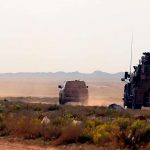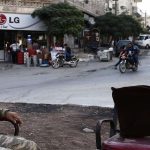Armed groups have committed abuses in rebel-held Idlib and Turkish-controlled areas, rights groups say.
Beirut, Lebanon – The last rebel-held enclave was meant to be a safe zone for three million displaced Syrians who fled government-controlled areas fearing arrest, torture or both.
But similar crimes are happening in Idlib province – although to a lesser extent than they have been committed in government-controlled territory – as well as in areas west of the Euphrates.
Hay’et Tahrir al-Sham, also known as HTS, the former al-Qaeda affiliate which dominates Idlib and parts of west Aleppo, and some of the other rebel groups backed by Turkey in north Aleppo, have been accused by human rights groups of looting, extortion and torture.
An agreement between Russia, Turkey and Iran last September succeeded in shielding the province in northwestern Syria from an attack by the Syrian government, which would have likely been catastrophic. But the deal has not been sufficient to protect residents from a failing economy and the lawlessness in the enclave.
 |
| Displaced Syrian children arrive at a refugee camp in Atimah village, Idlib, in September [File: Khalil Ashawi/ Reuters] |
The daily lives of many civilians continue to be paralysed by collective fear that they may be picked up and tortured if they are unable to pay a ransom.
In some cases, rebel gangs have seized men to punish them for preferring a rival faction, while in others, the kidnappers have been motivated by money.
Arrests, torture by armed groups
On September 4 last year, Mohammad Nour Hemedi, a retired judge, was shoved in a silver van by five masked men outside his farmhouse near Idlib city.
“They extracted my toe-nails,” he said. “I had never even heard about such torture.”
Recounting his 21-day ordeal, the judge said that he was given a bottle of water and fed a loaf of bread a day. Sometimes, when the captors felt charitable, he was given an apple.
He was forced to defecate in an open plastic container which stayed in his underground solitary cell for days on end.
They demanded a ransom of $300,000 but settled for $50,000, a hefty sum even for a judge’s family to put together.
Hemedi said that at least two of his friends, wealthier Syrians, were also abducted and released after paying a ransom of $120,000 each.
He did not say who abducted him, but said he was picked up in an area under the control of Hay’et Tahrir al-Sham.
Abdulghani Ramzi al Aryan, a local journalist, was kidnapped and thrown in a hen-house for 24 hours on January 1 this year in Salaqin in Idlib. “They hit me with their hands and feet and with the butt of their guns,” he said.
Aryan also said he did not know who kidnapped him but said that once before, in 2017, he was taken in by fighters from Hay’et Tahrir al-Sham for reporting on infighting with another group, Faylaq al-Sham.
Those abducted rarely reveal the names of the abductors, often because they fear retribution.
However, Human Rights Watch released a report in January and found Hay’et Tahrir al-Sham responsible for the kidnapping of at least eleven people, and the torture of six people.
 |
| Fighters from Hay’et Tahrir al-Sham are seen outside the villages of al-Foua and Kefraya in July [File: Khalil Ashawi/ Reuters] |
The Syrian Network for Human Rights claimed that Hay’et Tahrir al-Sham has arrested 184 people in the last three months.
Lama Fakih, deputy Middle East director at HRW, said: “We have seen HTS use some of the same tactics as the Syrian government, such as illegal detentions and torture.”
She said that HRW defines Hay’et Tahrir al-Sham as an “extremist” group because of its affiliation with al-Qaeda in the past and because it is labelled as a terrorist organisation by the United States and Turkey.
Arun Lund, a Fellow with the Century Foundation, said that despite Hay’et Tahrir al-Sham officially cutting ties with al-Qaeda and forming a Salvation Government, its administrations wing responsible for the provision of basic amenities like water and electricity in Idlib, the group is still seen as “extremist” because it is hard to pin down their exact relationship with al-Qaeda.
“They will be on terrorism lists as long as the United States, Russia, and other nations perceive them as al-Qaeda linked, or just as intolerably extreme and dangerous. And that perception obviously exists now,” Lund said.
Since the Sochi agreement, Hay’et Tahrir al-Sham has strengthened itself in Idlib and expanded to the countryside in Hama and Aleppo in recent days.
The agreement is mute on Hay’et Tahrir al-Sham’s presence in wider Idlib and Turkey is not bound to contain the group.
However, the understanding is that Turkey is responsible for reining in the group and having its members either join the conglomeration of almost a dozen rebel groups – the National Liberation Front (NLF) formed in May last year – or give up its weapons and leave the area. Neither outcome has been achieved.
 |
| A Syrian opposition fighter stands at a checkpoint in Idlib city in October [Ugur Can/ DHA via AP Photo] |
Fakih said that Turkey has lines of communications with Hay’et Tahrir al-Sham and that it should use its leverage over the group regarding their treatment of civilian population.
Joshua Landis, director of the Center for Middle East Studies at the University of Oklahoma, said that Turkey’s influence over Hay’et Tahrir al-Sham has waned.
“Turkey is supposed to control Idlib, but it does not. HTS has defied Turkish requests all along,” he said.
He added that the fear that the Syrian government might still invade Idlib is possibly causing the group to opt for desperate measures.
“At any moment Syria could decide to invade forcing the HTS fighters to flee,” he said. “No doubt, many are looking to feather their nests or stash away money to ensure they can smuggle themselves out of Syria to some safer place.”
Lack of protection
Syrian Activists have been targeted by a range of groups over their real and suspected allegiances in Idlib and in areas west of the Euphrates, which are under the control of the Turkey-backed NLF.
In June, the Office of the United Nations High Commissioner for Human Rights (OHCHR), gave a detailed account of human rights abuses in areas under Turkish control such as Afrin, al-Bab and Jarablus.
In a report, it said: “There are high levels of violent crime, with civilians falling victim to robberies, harassment, abductions, and murder.”
It quotes a case of 10 civilians being shot in the head in al-Bab because of inter-group rivalry.
The report described the situation as volatile, adding that the de facto authorities in the region were unable to act to ensure public order.
Elizabeth Tsurkov, research fellow at the Israel-based Forum for Regional Thinking, said that Turkey seemed unwilling to contain the problem in areas under the control of groups it backs.
“As an occupying force, Turkey has an obligation to protect the lives and property of Syrians living under its control,” she said.
“Especially since the factions carrying out much of the abuse are financed and trained by Turkey.”
Media activist Bilal Srewel was kidnapped in Afrin in November and tortured by a Free Syrian Army group called the Sultan Murad Brigade, which is almost entirely funded by Turkey.
“The first criminal is Assad,” he told Al Jazeera. “But all revolutionaries understood that by 2014, the so-called FSA had ended and had been replaced by militias. It’s a disgrace.”
When news of Srewel’s abduction and torture spread on social media, Turkish authorities came to his rescue. He said he is now based in Turkey.
 |
| Fighters from the NLF gather on the front line with Syrian government forces in October [Omar Haj Kadour/AFP] |
Another young man, who chose to stay anonymous, says he was kept in confinement for a month by the al- Hamzat Battalion, a part of the NLF, in Afrin.
Some of the violence is caused by criminal gangs divorced from the political factions. The enclave that comprises Hay’et Tahrir al-Sham-held Idlib and the NLF-controlled northern Aleppo is squeezed between government forces and the sealed-off Turkish border.
The lack of free movement and the arrival of more than two million Syrians has debilitated the local economy, one reason for the descent into lawlessness.
Goods transported through government areas or Turkey became more expensive, with added costs such as increased fees at the checkpoints. International organisations have cut aid in the education and health sectors because of the fear that the money may end up in the hands of Hay’et Tahrir al-Sham.
Salaried personnel including those working for the western aid sector run a particular risk of being targeted.
Syria Relief, a charity backed by British doctors, offers medical help to the people in Idlib by training and paying the salaries of doctors on the ground.
Hamish de Bretton-Gordon, a former British army colonel and an adviser to the group, said that in the last eight weeks, at least two of its doctors have been abducted.
“The captors demanded a ransom of $50,000 for one of them,” he said. “It could not be paid and we believe he has been killed.”
With nowhere to flee to, the civilians in the rebel enclave are forced to live under the control of whoever holds the weapons.
SOURCE: AL JAZEERA NEWS



